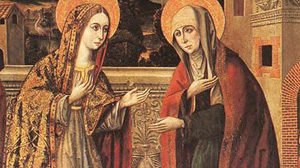Zephaniah 3:14-18a
Luke 1:39-45
Reflection:
As we near the birthday of someone we know, a festive mood of joy and celebration prevails, which is usually the case, unless the birthday celebrant him or herself is not exactly joyous over the event. In the case at hand, of course, most of us who are believers in the significance of the birth of the Lord Jesus among us have adequate reason to be joyful.
And our joy is well expressed by a woman in today’s gospel, Elizabeth, the mother of John the Baptist. The entire gospel selection for the day is devoted to her exuberance at the visit of her young kinswoman, Mary, who has just arrived from relatively far away, perhaps not the case in our contemporary experience of travel, but certainly very much so in earlier, bygone, days. Elizabeth is undoubtedly thrilled, and proud, at the considerable effort made by Mary to be near her at this particular time, since both women were pregnant with two very promising offspring. And both were experiencing this, their first childbirth event, in rather remarkable ways.
Today’s gospel event is totally devoted to Elizabeth’s experience of joy. Mary’s expression of the same sentiment will be forthcoming in the bible readings to follow. Elizabeth’s joy is based on both her own remarkable experience of becoming pregnant at an advanced age, and also on what her now mute husband (Zechariah) was able to convey to her about his own part in this good news (which, at the moment, was not exactly good news for him, given his present affliction). Elizabeth’s joy is undoubtedly enhanced by what had been a likely sorrowful experience that she and he had undergone throughout their marriage at their inability to beget a child, a blessed event eagerly anticipated by every married couple, especially in the Israel of that time. So certainly neighbors and friends would have shared joy in learning of Elizabeth’s good fortune, having known of her sorrow prior to this.
We have a corresponding reading today from the Old Testament: the prophet Zephaniah. That is, it too is a joyful piece, following on a painful ordeal. However, the circumstances surrounding this prophecy and its joy differ from those found in the gospel piece, if, for no other reason than that it occurred in a different time period, several hundred years earlier than that presented in the day’s gospel. But there is this common thread running throughout both this prophecy and the visitation event. They both occur after a drought of any such good, joyful news. For just as Elizabeth and Zechariah went through some sad days in their marriage, so the city of Jerusalem, where Zephaniah lived, had had its experience of sorrow over the tragedies and calamities that had been inflicted on it by its enemies over the recent centuries, clearly permitted by the Lord as a result of the city’s sinful behavior. But the prophet Zephaniah indicates today that this is now a thing of the past, and that Jerusalem is to enjoy a period of peace and prosperity.
So in both readings we have a mixture of joy and sorrow. And we note the sequence in which they occur: sorrow first, then joy. And it leads to the question: is this not usually the case, in the lives of all of us? That the sorrow-joy sequence is more commonly experienced, than joy-sorrow events? This is hardly true across the board, of course, but it seems that, within our own limited experience of things, the impact of sorrow/joy, in that sequence, is more compatible with our make-up, than the sequence of joy/sorrow. Why is that, since each involves the same elements? Perhaps this is because it is “easier” to enter into, first, sorrow, and then joy, than it is to enter into, first, joy, and then sorrow, especially if our joyful moment is already anticipating a sorrowful event to happen. Whereas anticipating a joyful event about to occur can at times dilute a current experience of sorrow. Going to the dentist, with a plan to attend a party afterward, is easier to undergo than to go to a party, while planning to make a visit to the dentist’s office afterward. They each involve similar experiences, but in different time sequences.
Both Mary and Elizabeth were coming off of stressful moments in their lives (Mary’s encounter with the angel, and Elizabeth’s long childlessness), making their experience of mutual joy at the time of Mary’s visit to her cousin thoroughly understandable, as was Zephaniah’s joy at the relief now available to the city of Jerusalem and its people following their long-standing subservience to an enemy. And, in general, it seems joy is more readily shared than sorrow. So we look forward to Christmas and the good news that the angels plan to announce over the grazing lands near Bethlehem.
Fr. Sebastian MacDonald, C.P. is a member of the Passionist formation community at Catholic Theological Union, Chicago.

